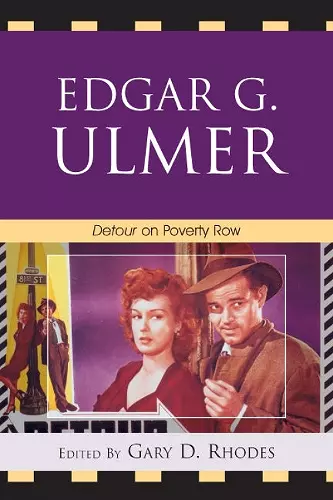Edgar G. Ulmer
Detour on Poverty Row
Format:Paperback
Publisher:Lexington Books
Published:21st Dec '09
Currently unavailable, and unfortunately no date known when it will be back
This paperback is available in another edition too:
- Hardback£113.00(9780739125670)

Edgar G. Ulmer: Detour on Poverty Row illuminates the work of this under-appreciated film auteur through 21 new essays penned by a range of scholars from around the globe. Ulmer, an immigrant to Hollywood who fell from grace in Tinseltown after only one studio film, became one of the reigning directors of Poverty Row B-movies. Structured in four sections, Part I examines various contexts important to Ulmer's career, such as his work at the Producers Releasing Corporation (PRC), and his work in exploitation films and ethnic cinema. Part II analyzes Ulmer's film noirs, featuring an emphasis on Detour (1945) and Murder Is My Beat (1955). Part III covers a variety of Ulmer's individual films, ranging from Bluebeard (1944) and Carnegie Hall (1947) to The Man from Planet X (1951) and Daughter of Dr. Jekyll (1957). Part IV concludes the volume with a case study of The Black Cat (1934), offering three different analyses of Ulmer's landmark horror film.
Gary D. Rhodes, a master at making out-of-the-way topics both accessible and appealing, performs a grand service with this savvy forum on the strange and necessary filmmaking career of Edgar G. Ulmer. From the martyred brilliance of The Black Cat through the unlikely finery of Bluebeard and Detour—with his own tangle of detours into ethnic cinema, symphonic soap opera, and drive-in schlockery—Ulmer comes into view for the first time as a compleat artist, perhaps the most influential forebear of the New Century's independent-cinema movement. -- Michael H. Price, Author of Forgotten Horrors, Vols. 1-5
Few filmmakers have been as criminally underrated as Edgar G. Ulmer, doyen of Hollywood's more modest studios and an artist of rare, luminous talent. Four decades after his death his unique and idiosyncratic oeuvre receives proper and rightful consideration in Edgar G. Ulmer: Detour on Poverty Row—a book that probes into the genius behind Ulmer's shoestring offerings and finds it lurking there, in abundance. -- Tony Earnshaw, National Media Museum (UK)
These authors have interesting and sometimes challenging ideas and write about them well. Rhode's volume shows the hand of a strong editor with strong convictions, which are laid out in his introduction. -- Bill Krohn * Cineaste *
This volume fills an important gap in film studies, offering many insights into the work of a key auteur, the understudied Edgar G. Ulmer. Using Ulmer's many contributions as a lens, it shows the roles of the small independent film company and independent filmmaker in the Hollywood studio era. By taking us through Ulmer's work directing ethnic and minority films, his creative producing practices, and his signature efforts at fashioning a visual style that invariably transcended low budgets and creaky narratives, Gary Rhodes and his contributors have provided one of the most revealing assessments to date of alternative film practices in an era largely dominated by a classical narrative aesthetic. Detour on Poverty Row is a significant contribution to film history. -- J. P. Telotte, Georgia Institute of Technology; author of Science Fiction TV; editor of The Essential Science Fiction Television Reader
ISBN: 9780739125687
Dimensions: 233mm x 154mm x 25mm
Weight: 501g
350 pages